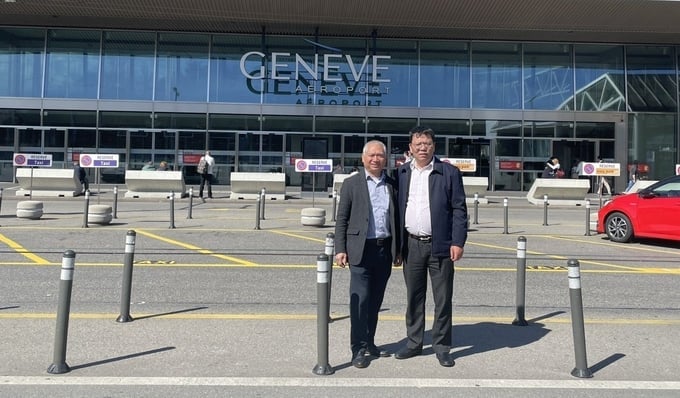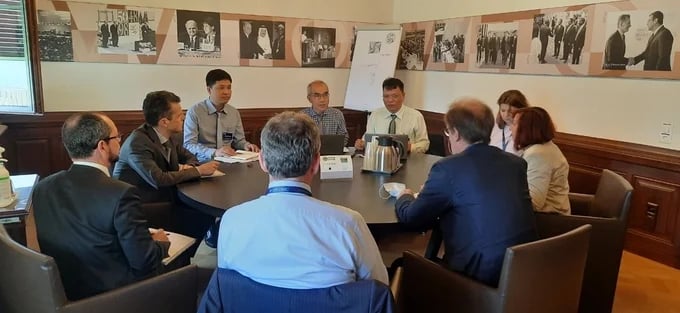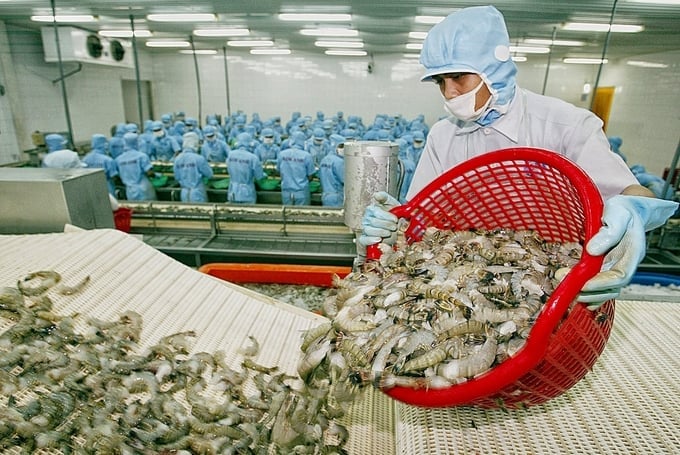May 21, 2025 | 03:23 GMT +7
May 21, 2025 | 03:23 GMT +7
Hotline: 0913.378.918
May 21, 2025 | 03:23 GMT +7
Hotline: 0913.378.918

Mr. Nguyen Ha Hue, Agricultural Counselor at the Permanent Mission of the Socialist Republic of Viet Nam to the United Nations Office and other international organizations in Geneva, and Mr. Ngo Xuan Nam, Deputy Director of SPS Vietnam, at the headquarters of international organizations in Geneva. Photo: Vietnam SPS.
Vietnam participated in the 88th Session of the SPS/WTO Committee in Geneva, Switzerland from March 18 to March 25. The Vietnamese delegation consisted of representatives from Vietnam SPS, the Department of Plant Protection, the Interdisciplinary Steering Committee on International Economic Integration, and the Permanent Mission of the Socialist Republic of Viet Nam to the United Nations Office and other international organizations in Geneva.
According to Mr. Ngo Xuan Nam, Deputy Director of Vietnam SPS, Vietnam's agenda for the 88th session consisted three main components. Firstly, Vietnam will attend several workshops organized by the WTO regarding the transparency of sanitary and phytosanitary measures.
Secondly, Vietnam will participate in the official session of the SPS/WTO Committee regarding sanitary and phytosanitary measures. Thirdly, Vietnam will address the delay in permitting the export of beef from Mexico.
Furthermore, the Vietnamese delegation will engage in three bilateral sessions, including: discussion with Norway regarding SPS measures and two-way agricultural trade; discussion with Brazil to address the regulations which caused the temporary suspension of tilapia imports; discussion with Saudi Arabia to expedite the opening of its market to Vietnamese aquacultural products.
"Vietnam SPS will actively negotiate and request trading partners to clarify regulations on SPS measures with regards to agricultural trade, thereby assisting businesses and the community in ensuring balanced and beneficial trade interests," Mr. Nam emphasized.
One of Vietnam's primary topics of discussion during the 88th session was the transparency in information sharing with Mexico. Regarding concerns from Mexico, Mr. Ngo Xuan Nam asserted, "Vietnam consistently adheres to the regulations of the World Organization for Animal Health (OIE) and the WTO concerning the import of animals and animal products from various countries."
According to Document No. 492/TY-KD issued by the Department of Animal Health, the procedures for importing animals into Vietnam and converting them into animal products (including beef) from other countries is as follows:
The competent authority of the exporting country provides information as requested by the Department of Animal Health. Subsequently, the Department of Animal Health will review and evaluate the the submitted documents. If the evaluation results are satisfactory, the Department of Animal Health will dispatch a delegation to the exporting country to conduct on-site inspections and evaluations.
If the on-site inspection and evaluation results are satisfactory, the Department of Animal Health will notify the exporting country, and both parties will mutually agree upon the templates for Export Veterinary Inspection Certificate and Exporting Business Registration.
The Department of Animal Health has repeatedly sent correspondence requesting Mexico to provide additional information to assess the risk of importing Mexican beef into Vietnam since 2016.
However, Mexico's delivery of the requested information is often delayed, with the information failing to meet the requirements, or being outdated. Namely, the requested information includes reports on the disease monitoring and surveillance programs, reports on the hazardous residue and microbial contamination monitoring programs in beef and beef products, data on the import and export of animal and animal products, etc.
The Department of Animal Health recently received Diplomatic Note No. VNM-00102 on February 2, 2024 from the Mexican Embassy in Hanoi. Accordingly, the note provided information regarding the risk assessment of importing beef and beef products from Mexico to Vietnam. After reviewing the documents, the Department of Animal Health, issued Document No. 431/TY-KD on February 26, requesting Mexico to continue providing additional information regarding their food safety monitoring system.
Most notably, important information includes detailed reports on the results of the hazardous residue monitoring program in beef and beef products for 2021. Regarding the report on the hazardous residue monitoring program in beef and beef products for 2022, Vietnam has requested Mexico to provide an investigation of the causes and remedial actions for each violation case.
Regarding reports on the microbial contamination monitoring programs in beef and beef products between 2021 and 2022, the Department of Animal Health requested Mexico to provide solutions for the handling of bacteria contamination, including Salmonella and E. coli, which has been identified in five samples. Additionally, the Department of Animal Health requested Mexico to update its results for the hazardous residue and microbial contamination monitoring programs in beef and beef products for 2023, in addition to implementation plan for 2024.
The Department of Animal Health emphasized that it has repeatedly requested Mexico to provide information regarding food safety monitoring programs. However, to date, Mexico has failed to comply with these requests.
Consequently, the Department of Animal Health urged Mexico to promptly compile and provide the requested information for the development of an on-site inspection plan in Mexico. Subsequently, the plan will be submitted to the Ministry of Agriculture and Rural Development for approval.
"It is evident that Vietnam's specialized agencies have been transparent regarding regulations and procedures for importing animal products from Vietnam to Mexico," Mr. Nam stated.

A meeting between the SPS Vietnam and the EU, on the sidelines of a meeting of the SPS/WTO Committee. Photo: Vietnam SPS.
Over six years ago on January 30, 2018, Saudi Arabia issued Urgent Notification No. G/SPS/N/SAU/336 concerning the order from the Saudi Food and Drug Authority (SFDA) regarding the "Temporary ban on the import of fish, crustaceans, and other aquatic products originating from Vietnam."
Subsequently, Saudi Arabia announced the lifting of the temporary ban on the import of naturally caught fish originating from Vietnam on October 6, 2020. However, the ban on aquacultural products, including shrimp and catfish, originating from Vietnam remained in place to date.
Mr. Ngo Xuan Nam analyzed that, according to the WTO SPS Agreement on emergency measures, and the recommended procedures to fulfill transparency obligations under the WTO SPS Agreement and SPS commitments in FTAs, emergency SPS measures can be applied immediately. However, the related party must provide their evidence in full within a two-month period.
During the 82nd and 87th sessions of the SPS/WTO Committee, Vietnam requested the SFDA to consider opening the market for Vietnamese shrimp and catfish products. At the 83rd session, Vietnam continued to urge the SFDA to promptly conduct inspections of the Vietnamese pangasius quality and food safety control system, with the goal of removing the import ban on aquacultural products.
To avoid adverse effects on the interests of businesses and consumers from both countries, during the 88th session, Vietnam requested Saudi Arabia to announce a plan and timeline for resolving the aforementioned issues in compliance with the WTO SPS Agreement.
Regarding other import markets, the Department of Quality, Processing, and Market Development received a notification from the Plant Inspection Agency under the Ministry of Agriculture, Livestock and Food Supply of Brazil (MAPA) on February 14, 2024. The notification declared the suspension of tilapia imports from Vietnam until a risk review conclusion is reached regarding the TiLV virus, according to Decision No. 270 dated February 9, 2024, by MAPA.
Similar to the ban issued by Saudi Arabia, Mr. Nam informed that, according to international norms and WTO guidelines, emergency SPS measures may only last up to two months. Subsequently, the importing country must report and clarify the ban in compliance with transparency obligations.
Based on Annex B, Section 6 of the WTO SPS Agreement on the transparency of SPS regulations, Vietnam requested the competent authority of Brazil to clarify the ban on tilapia imports. Additionally, Vietnam requested Brazil to conclude the risk review regarding the TiLV virus and lift the ban after April 24.
"The sudden imposition of bans has prevented Vietnamese businesses from meeting market requirements, resulting in substantial economic losses. As a result, Vietnam SPS will proactively and persistently request transparency and take measures to resolve these issues," Mr. Nam shared.

Vietnam is actively negotiating to reopen the market for shrimp and catfish to Saudi Arabia.
Opening a market for agricultural and aquacultural products typically requires a significant amount of preparation time, ranging from five to six years, for both parties to agree on SPS measures and related procedures, Deputy Director Ngo Xuan Nam stated.
Prior to the 88th Session of the SPS Committee, Mr. Nam pledged to provide transparent and comprehensive information to all 166 WTO state members, as well as countries participating in bilateral discussions with Vietnam, or countries with an interest in Vietnamese agricultural and aquacultural products.
Regarding production organization, Mr. Nam advised businesses, sectors, and relevant stakeholders to proactively research information on the requirements of each importing market. Accordingly, each country imposes a different set of regulations regarding sanitary and phytosanitary measures.
Vietnam is on the path to affirming its position and becoming the world's kitchen. Consequently, a singular flagged batch has the potential to damage businesses as well as the position and brand of Vietnamese agricultural products. Furthermore, the importing country may consider increasing the frequency of inspections and adding import procedures in the future.
"Vietnam has had multiple items placed under control with relatively high inspection frequencies in the past. Thanks to the efforts of businesses, the community, and regulatory agencies, we have effectively controlled issues regarding pesticide residues, antibiotics, quarantine targets and so on. I hope that the agricultural sector can fully internalize this issue, and enhance compliance with SPS measures," Mr. Nam concluded.
Translated by Nguyen Hai Long

(VAN) Japan's grant aid project contributes to capacity building, promoting organic agricultural production, and fostering sustainable community development in Dong Thap province.

(VAN) For years, the CRISPR-Cas9 genome technology has been reshaping genetic engineering, a precision tool to transform everything from agriculture to medicine.

(VAN) Vietnam aims to become a 'leader' in the region in the capacity and managing effectively soil health and crop nutrition.
![Reducing emissions from rice fields: [Part 1] Farming clean rice together](https://t.ex-cdn.com/nongnghiepmoitruong.vn/608w/files/news/2025/05/05/z6509661417740_a647202949c539012a959e841c03e1d3-nongnghiep-143611.jpg)
(VAN) Growing clean rice helps reduce environmental pollution while increasing income, allowing farmers to feel secure in production and remain committed to their fields for the long term.
/2025/05/19/5136-1-144800_230.jpg)
(VAN) The Nghe An Provincial People's Committee has just approved the list of beneficiaries eligible for revenue from the Emission Reductions Payment Agreement (ERPA) in the North Central region for the year 2025.

(VAN) 14 out of 35 domesticated elephants in Dak Lak province have had their living conditions improved, with 11 of them currently participating in the non-riding elephant tourism model.

(VAN) Muong Nhe Nature Reserve hopes that being upgraded to a national park will lay the foundation for forest protection efforts to be carried out in a systematic, modern, and sustainable manner.